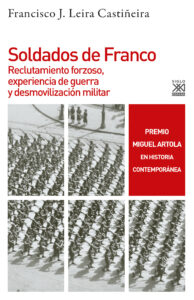Book Review: Franco’s Soldiers
 Soldados de Franco. Reclutamiento forzoso, experiencia de guerra y desmovilización militar, by Francisco J. Leira Castiñeira. Madrid: Siglo XXI, 2020. 347 pp.
Soldados de Franco. Reclutamiento forzoso, experiencia de guerra y desmovilización militar, by Francisco J. Leira Castiñeira. Madrid: Siglo XXI, 2020. 347 pp.
There is no better way to demystify the epic of warfare than adopting a soldier’s perspective. If Erich Maria Remarque’s All Quiet on the Western Front, Orwell’s Homage to Catalonia, or Coppola’s Apocalypse Now show anything, it’s that war is less about heroism and sacrifice than about incompetence and improvisation, blood and boredom, latrines and lice—and, above all, survival.
Francisco Franco liked to praise the “heroes” who’d fought and fallen “for God and Fatherland” to “save Spain from Communism.” A new study by the Galician historian Fran Leira—who in 2012 earned an honorary mention in ALBA’s annual essay contest—blows up this myth by asking a simple question: Who were Franco’s soldiers really?
In addition to Germans, Italians, and North-African mercenaries, the Nationalist troops included thousands of Spanish men, the majority of whom were conscripts. (The first military drafts in the Nationalist zones happened in early August 1936, barely three weeks after the army uprising.) Did they see themselves as the crusaders that Franco’s rhetoric made them out to be? Did they even share the Nationalists’ political views? Did they fight with enthusiasm or reluctantly? How did their image of themselves, the war, and Spain evolve in the postwar period?
Leira’s answer, though not surprising, is nonetheless eye-opening. Mostly focusing on Galicia, he combines painstaking archival research—including personal letters and diaries—with oral history to show that the individuals who made up Franco’s army were a highly diverse group who did not necessarily support the cause for which they had been enlisted. As the war went on, the Francoist army also frequently “recycled” captured Republican soldiers; but even those who joined voluntarily often did so less out of conviction than for more opportunistic reasons. To keep their troops in check, army authorities resorted not only to persuasion and indoctrination but also to strict surveillance and punishment.
After the war, the former soldiers became the object of official praise and the beneficiaries of veteran-friendly policies (though these were often badly executed). At the same time, many had to deal with the psychological fallout of the violence that they’d suffered or, worse, perpetrated. Rather than pride in their military past, Leira suggests, shame was the dominant sentiment. And even if they were not actively opposing the dictatorship, the majority of the veterans “were not Francoist when they were enlisted, nor did their experience at the front turn them into Francoists”.
Leira places his work in the line of scholars like Leonard V. Smith, a US historian of France who has studied World War I soldiers’ and veterans’ experiences. In the Spanish context, Leira’s focus on the situation at the front complements the extensive research, by Francisco Espinosa and others, of political repression in the Nationalist rearguard. But like all historians, the author, too, is a child of his times. Leira, who is 33, came of age during the rise of the memory movement in Spain, which also transformed how historians of the war and the dictatorship approached their work. He is part HISTAGRA, the Galician collective associated with the project Nomes e voces, which helps make historical research available to victims of Francoist repression.
Yet Leira also seeks to complicate the story embraced by many of the Spaniards who have been fighting for the rights of those who suffered from Francoist repression. Among other things, he argues it is time to adopt a more complex and capacious understanding of the notion of the victim. “We cannot forget that [Nationalist] soldiers were the victims of forcible recruitment, victimizers inasmuch as they engaged in violence at the front and, then again, victims of a badly managed country.” The soldiers whose stories Leira uncovers saw their memory confiscated by the Franco regime, which turned them into “warriors of the Crusade” and “martyrs of the Spanish nation.” What Leira seeks to do, as a historian, is to return their messy, heterogeneous memory to its rightful owners.













[…] Full text at The Volunteer. […]
En todas las guerras que ha habido a lo largo de la HISTORIA se ha movilizado a muchos soldados de manera forzosa. Los voluntarios o soldados profesionales han sido una minoría que ha supuesto la tropa inicial, pero al alargarse la guerra ha sido imprescindible hacer levas forzosas. La zona controlada por el frente popular hizo lo mismo y controlaba a sus pobres soldados de reemplazo, obligados, mediante comisarios políticos, muchas veces despiadados con ellos, pues hacían un uso excesivamente violento de su poder con tiros por la espalda a sus propios soldados o frecuentes e injustos fusilamientos, para diezmar a los que acusaban de “chaquetear” con el enemigo. Olvidarlo, es hacer propaganda política en lugar de ciencia histórica.